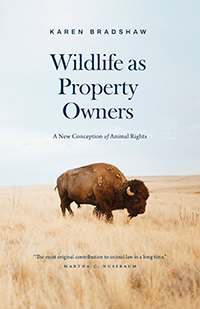Wildlife as property owners
a new conception of animal rights
- ISBN: 9780226571362
- Editorial: University of Chicago Press
- Fecha de la edición: 2021
- Lugar de la edición: Chicago. Estados Unidos de Norteamérica
- Encuadernación: Rústica
- Medidas: 23 cm
- Nº Pág.: 203
- Idiomas: Inglés

Humankind coexists with every other living thing. People drink the same water, breathe the same air, and share the same land as other animals. Yet, property law reflects a general assumption that only people can own land. The effects of this presumption are disastrous for wildlife and humans alike. The alarm bells ringing about biodiversity loss are growing louder, and the possibility of mass extinction is real. Anthropocentric property is a key driver of biodiversity loss, a silent killer of species worldwide. But as law and sustainability scholar Karen Bradshaw shows, if excluding animals from a legal right to own land is causing their destruction, extending the legal right to own property to wildlife may prove its salvation. Wildlife as Property Owners advocates for folding animals into our existing system of property law, giving them the opportunity to own land just as humans do—to the betterment of all
Part I: A Foundational Understanding of Animal Property Law
1: The Nexus of Animal Rights and the Rights of Nature
2: Biodiversity Loss as a Property Law Problem
Part II: Revealing the Existing Body of Animal Property Rights
3: The Biological Origins of Property
4: Uncovering Animal Rights in Existing Property Law
Part III: A Roadmap for Property Ownership to Benefit Biodiversity
5: Using Legal Trusts to Implement a System of Animal Property Rights
6: Traditional Legal Pathways to Formalizing Animal Property Rights
7: Leveraging Property Rights to Aid Biodiversity
8: Case Studies of Stakeholder Collaborations Managing Resource Competition between Humans and Wildlife
Case Study 1: Ranchers and Wild Horses in the West
Case Study 2: Outsourcing Thick-Billed Parrot Recovery to Mexico
Case Study 3: Traditional Ecological Knowledge and Scientific Management of Caribou
Part IV: Analyzing the Potential of Animal Property Ownership
9: Evaluating a Property-Based Approach to Biodiversity Preservation
10: The Implications of Interspecies Ownership on Property Theory
Conclusion: Are Animal Property Rights the Rights of Nature?






